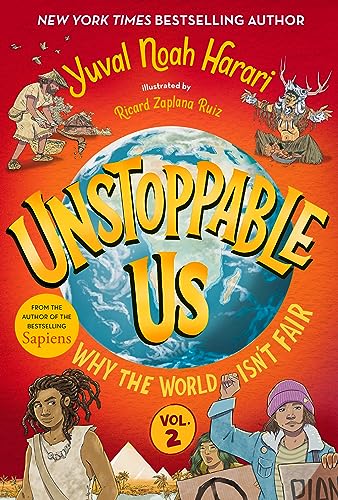What do you think?
Rate this book


208 pages, Hardcover
Published March 5, 2024
Before the Agricultural Revolution, humans didn't try to control much. They gathered wild fruits and hunted wild animals and occasionally burned a forest or dug a trap, but they only rarely told plants where to grow, or water where to flow, or rocks where to roll. After the Agricultural Revolution, farmers became control freaks. From the moment they woke up until the moment they went to sleep, people like Wheaty and her family were busy telling the world around them what to do.
-----
Controlling animals and plants made farmers far more powerful than before. But power isn't happiness, nor is it peace. . . . When you try to control others, you often make them seriously unhappy--and you often end up unhappy yourself. That's exactly what happened in the Agricultural Revolution.
The farmers thought that the things around them--wheat plants, water, and sheep--should do exactly as they were told. That demanded a lot of hard work from the farmers, and eventually they found that they too were doing what somebody else told them to do. They were more and more controlled by priests and chiefs.
-----
There were many advantages to having a large kingdom like ancient Egypt, but controlling a big kingdom was a big headache. The pharaoh had to organize so many people and so many things. And to do that, two very important questions needed answering: "Who owns what?" and "Who owes what?"
-----
Bureaucracy works like magic. In fairy tales, you read about sorcerers who can create or destroy entire villages by uttering a spell. Bureaucrats can create or destroy villages by moving paper around. An evil bureaucrat can make a village starve just by putting the paper with the village tax record in the wrong drawer. A good bureaucrat can rescue the village by finding the missing document or deleting the name of the village from the king's tax list. One stroke of the pen and a hundred people are saved.
-----
The only way to keep order--in a house or in a kingdom--is to have lots of people who follow the rules all by themselves, without needing rewards or punishments. But why would they do that? Because they believe in the rules. That's the secret of every successful system: people obey the rules because they believe in them.
But what causes people to believe in the rules? More important, what causes even poor and enslaved people to believe in rules that make them so miserable?
The answer is stories! You may think there's nothing useful about telling stories, but it's actually the greatest power humans have. It's our secret superpower! By convincing people to believe in the rules, a good storyteller can do the work of a hundred soldiers far more efficiently.
-----
Kids have one big advantage over adults here: they haven't heard the stories as many times. . . . By the time you're fifty, you've heard it thousands of times and you've even told it to your own kids. It's much harder to change your mind.
So, if a bad story needs changing, it will probably be kids who do it.
That means you have a big responsibility--and a great opportunity. And remember, if you're not sure which stories need changing, you can ask that important question: does this story cause suffering?
If a story causes a great deal of suffering, be very careful about that story. Best of all, talk to someone who's suffering because of it, and ask them to tell you their story. Then open your mind and your ears . . . and listen.